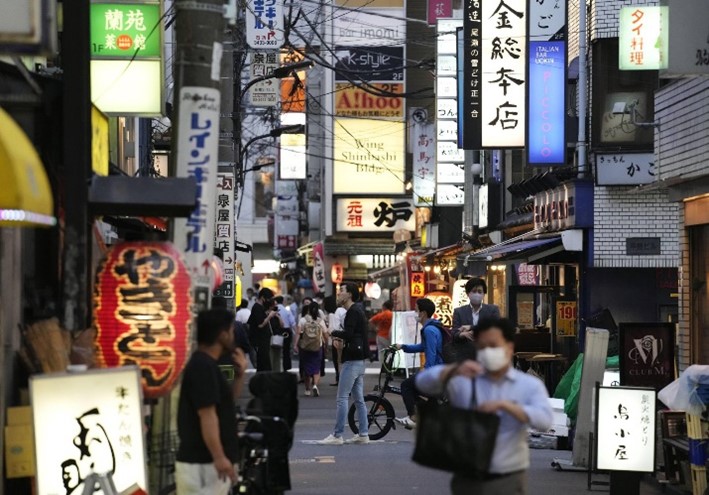Tokyo may struggle to bring quasi-emergency measures to an end as cases rebound

• Jun 27, 2021
Tokyo is starting to see signs of a resurgence of the coronavirus, making it less likely the capital will see an end to quasi-emergency measures on July 11 as scheduled.
The government is hoping to stop the rebound in infections from worsening by accelerating vaccination efforts and boosting measures to restrict the movement of people.
Measures need to be taken urgently, especially as deteriorating conditions may force the country to ban spectators from the Tokyo Olympics and Paralympics this summer.
Economic revitalization minister Yasutoshi Nishimura, who leads the government’s COVID-19 response, hinted Sunday that another coronavirus state of emergency may be declared depending on infection levels in Tokyo and other areas that are seeing signs of a resurgence.
“If necessary, we should not hesitate to declare a state of emergency and should be flexible about declaring it for areas that are currently placed in a pre-emergency stage,” Nishimura said on a television program.
While noting that infections among older people have been declining, the minister said, “How to contain the spread of the virus among active people in their 20s and 30s has become an issue.”
“To curb the viral spread at this moment, it is inevitable to introduce strong measures,” Nishimura said. “We must consider steps such as asking restaurants to stop serving alcohol again.”
The daily number of cases in Tokyo rose by more than 100 from a week earlier on Saturday, the fourth consecutive day that had happened. A total of 386 cases were recorded Sunday, up slightly from the 376 logged the previous week.
One factor driving cases up is the increased movement of people.
The increase in people’s movement had already been seen before the most recent state of emergency ended in Tokyo on June 20. Data by the Cabinet Secretariat show that movement among people age 60 and over, in addition to young people, has increased since the beginning of June.
Meanwhile, many restaurants and bars have begun serving alcohol even after 7 p.m., despite the government’s request to refrain from doing so.
Such developments led one expert to predict that the highly contagious delta variant will become the main coronavirus strain in Japan in July.
According to informed sources, government simulations predict that the average daily number of infection cases in Tokyo over a week will reach around 700 by July 20, immediately before the July 23 start of the Tokyo Games.
“We’ll be lucky if we can withstand it just by continuing pre-emergency measures,” a senior government agency official said.
The resurgence in infections are also forcing a reconsideration of how the Tokyo Olympics should be held.
The central and Tokyo governments and the organizing committee have set the maximum number of spectators at 10,000, but the decision is based on the assumption that pre-emergency measures will be lifted by the start of the Olympics.
Prime Minister Yoshihide Suga said that he will not shy away from barring spectators to ensure a safe and secure games if a state of emergency is declared, but did not elaborate on what he will do if pre-emergency steps continue.
“If the pre-emergency designation cannot be lifted, the Olympics should be held without spectators,” a Cabinet minister said.
Meanwhile, there are positive signs as well. The rate of infections among older people, who have higher risks of developing severe symptoms after contracting the coronavirus, has remained low.
Nishimura said that the government will analyze the effects of vaccinations on the rate of infection for older people.
The government is aiming to complete two shots of the coronavirus vaccine for all people age 65 and older by the end of July so that severe symptoms become less frequent and burdens on medical institutions are reduced.
However, a member of a government expert panel said, “It is dangerous to put expectations on the effects of vaccinations at this point, as there are cases of delays in inoculations at some care facilities for older people.”
The expert said that changes in the number of new infections should be watched closely.
From the week starting Monday, the central government will consider boosting infection prevention measures, possibly by asking restaurants to stop serving alcohol again, in cooperation with the Tokyo Metropolitan Government.
The central government plans to decide whether to lift the ongoing quasi-emergency measures in Tokyo and other areas around July 8.



